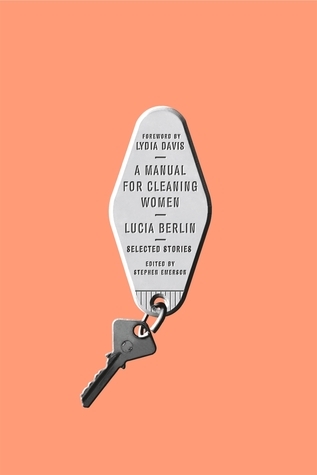Publisher: Farrar, Straus and Giroux. August 2015.
Pages: 432
Genre: Short stories
Source: Library
ADD TO GOODREADS
BUY FROM INDIEBOUND
BUY FROM BOOK DEPOSITORY
A MANUAL FOR CLEANING WOMEN compiles the best work of the legendary short-story writer Lucia Berlin. With the grit of Raymond Carver, the humor of Grace Paley, and a blend of wit and melancholy all her own, Berlin crafts miracles from the everyday, uncovering moments of grace in the Laundromats and halfway houses of the American Southwest, in the homes of the Bay Area upper class, among switchboard operators and struggling mothers, hitchhikers and bad Christians.- Goodreads
I wasn't going to review this book. I really wasn't. Because how does one even begin to go about describing what it feels like to be in love? Ok, maybe that's hyperbolic, but at the same time I'm feeling the same excitement and utter loss for words. I almost skipped this book because of all the hype. Because that's the kind of person I am. I figured there's no way I won't be disappointed by a book getting this much press and acclaim. But I am here to tell you that I, the coldest heart this side of the Mississippi, always ready and willing to hate, believe the hype is entirely justified and that this book needs more. This collection of short stories is a masterpiece.
I've only had this feeling with a few other authors. Shirley Jackson, Lydia Davis, Vladimir Nabokov. You just have a moment when you're reading where you go "wow, this person is actually a literary genius and I am not worthy." Prepare yourself for that feeling. Lucia Berlin is incredible in the least pretentious way possible. When you read her stories it's like being told a story by a friend. Granted, a friend who's seen a lot of life. Her writing is beautiful without it being easy to put your finger on why. Not a word is wasted and her voice is so strong and compelling. Normally I mark a bunch of passages that I like, but I had to give up with Berlin, because I loved it all so much. I was running out of book darts.
After a long time the cranes did come. Hundreds, just as the sky turned blue-gray. They had landed in slow motion on brittle legs. Washing, preening on the bank. Everything was suddenly black and white and gray, a movie after the credits, churning.
As the cranes drank upstream the silver water beneath them was shot into dozens of thin streamers. Then very quickly the birds left, in whiteness, with the sound of shuffling cards.
The stories in this book are a selection of her best works put in order chronologically. What's brilliant about this is that Lucia Berlin writes very autobiographical stories. It essentially feels like you're growing beside her, like you're watching her life unfold. And this lady has been through all sorts of shit. For a while she lived in mining camps in America, then she moved to Chile where she lived flamboyantly into her 20s. She moved back to America and lived much less flamboyantly. She worked as a maid. She was married 3 times, had some kids, had some affairs, and struggled with alcoholism for most of her life. Most of her stories are about poverty, alcoholism, relationships, family, death. That's part of why I thought I wouldn't be interested, but I was wrong. Berlin is sharp as a tack, she has all sorts of hutzpah, and boy can she tell a story (often in only a few pages or less).
Women’s voices always rise two octaves when they talk to cleaning women or cats.
I still really don't know what to say about this collection of short stories. I'm tongue-tied. I don't want to try to describe the pieces, because I know they'll all fall flat in my summation. All I can ask is that you please take the time to AT LEAST read this excerpt from it. "Carpe Diem" was one of the stories that really got to me and you can read it online here. I'm so grateful to have read A Manual for Cleaning Women. I genuinely feel lucky to have had the opportunity, which is an incredible feeling to have after reading a book. I want you to feel that too.
The only reason I have lived so long is that I let go of my past. Shut the door on grief on regret on remorse. If I let them in, just one self-indulgent crack, whap, the door will fling open gales of pain ripping through my heart blinding my eyes with shame breaking cups and bottles knocking down jars shattering windows stumbling bloody on spilled sugar and broken glass terrified gagging until with a final shudder and sob I shut the heavy door. Pick up the pieces one more time.

